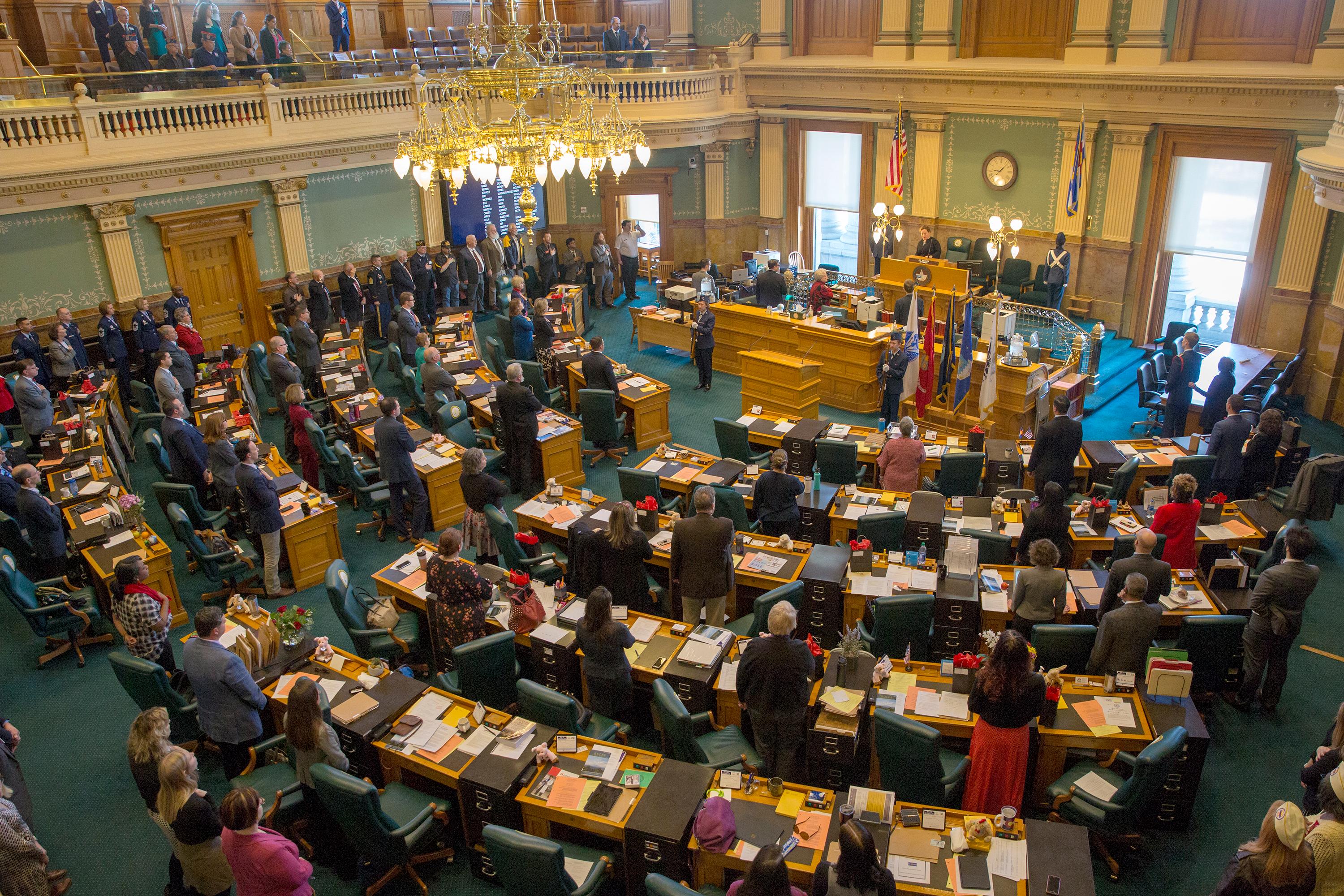

Colorado’s 2019 legislative session saw its fair share of drama: graphic debates lasting in the wee hours of the morning, a committee hearing in the middle of the bomb cyclone, the Senate’s minority caucus suing Democratic leaders for using a robot choir to read a bill.
And to cap it off: the first weekend session in more than a decade.
Theatrics aside, lawmakers managed to pass several major Democratic priorities. Despite a well-funded and vocal opposition, Gov. Polis signed the most significant update to Colorado's oil and gas regulations since 1951. He also approved a controversial "red flag law," which gives judges the power to temporarily remove firearms from people believed to be a threat to themselves or others. Not to mention a bill that could someday award Colorado’s electoral votes to the presidential candidate who wins the national popular vote.
It culminated in a jam-packed finale to the legislative session, which wrapped up May 3. Here's the outcome of some of the biggest issues on lawmakers’ to-do lists.
❌ Paid Family Leave
What You Need To Know: If it had passed as originally written, within a few years every Colorado worker could’ve taken up to 12 weeks of paid time off to care for a sick relative, bounce back from a health condition or welcome a new child. To pay for the program, Dems wanted the state to collect a premium on each person’s paycheck, with employees and employers sharing the cost.
Much of Colorado’s business community opposed it, wanting changes to give employers more leeway to provide their own plans, exceptions for small businesses, and to narrow the state’s definition of “family.”
Status: Without the Democratic votes to pass Senate Bill 19-188, and concerns from Gov. Jared Polis, the Democratic sponsors have rewritten it. What started out as an ambitious plan to set up a statewide paid family leave program will end up as a task force to study the idea. The Democratic sponsors say they’re still on track to have the program providing benefits by 2024.
❌ Tobacco Tax Increase
What You Need To Know: This last-minute bill would ask voters to raise taxes on cigarettes and impose new taxes on nicotine vaping devices, like the popular JUUL. The plan you rise more than $300 million annually for Colorado. The money would be split between education and health programs, like tobacco prevention and mental health services.
Critics say the higher taxes would only serve to fuel a black market, which would hurt small businesses and local tax bases.
Status: Introduced 10 days before the end of the legislative session, the HB 19-1333 was defeated in the state Senate on Thursday, May 2. Reporters in the state Senate only counted nine Democrats who support the bill. The stinging defeat for Gov. Polis is a sign that his party may not be united on “sin taxes,” which many saw as regressive.
❌ School Immunization Requirements
What You Need To Know: Many public bill hearings this session have stretched late into the evening, but nothing has come close the debate on Democrats’ plan to increase vaccination rates. The debate lasted until 4 a.m. in committee and 3:30 a.m. on the House floor. Opponents who don’t believe vaccines are safe or effective say the proposal infringes on parents’ rights.
Democratic Rep. Kyle Mullica’s bill would require parents to submit a form in-person to a local health department the first time they seek a non-medical vaccine exemption. Right now it can be submitted directly to a school.
According to the Centers for Disease Control and Prevention, Colorado is now dead last in the country for kindergarten vaccinations for diseases like measles, mumps and rubella.
Status: HB 19-1312 was laid over in the state Senate on Thursday, May 2, leaving too little time for the bill to pass the finish line. The legislation had broad support from Democrats in the House, but it faced a roadblock in Gov. Jared Polis, who told CPR he’s wary of government forcing decisions on parents. “You’re going to create distrust of vaccinations,” he said. “We want to go the other way...for people to see good science.”
✍️ Full-Day Kindergarten
What You Need To Know: Under current law, Colorado provides funding for half-day kindergarten. Some districts cover the cost of the other half while other districts charge families tuition to fill the gap. 13,300 students attended half-day programs this school year.
Gov. Polis made moving to full-day kindergarten a centerpiece of his reelection campaign. He continued to push the idea during the legislative session, making it a key part of his state-of-the-state address and testifying directly before lawmakers.
Lawmakers have already set aside $175 million to pay for kindergarten students at the same rate as older students. Under the bill itself, districts would also be banned from charging kindergarten tuition.
Status: After unanimously passed the state Senate, HB 19-1262 cleared a concurrence vote in the House and now heads to Gov. Polis.
✍️ Comprehensive Sex Ed
What You Need To Know: The legislation updates Colorado's K-12 curriculum for comprehensive sex ed. If it passes, schools that choose to offer sex education would need to teach about consent, STD prevention and healthy relationships, while being inclusive of LGBTQ sexual experiences. The legislation bans "abstinence-only" sex ed.
In its current form, the bill includes $1 million in grants, prioritized for rural schools and schools without sex ed programs.
The proposal has seen fierce opposition from conservative parents and religious leaders, who packed its first committee hearing. Many opponents objected to the requirement that students learn about same-sex relationships.
Status: The state Senate gave its final approval to HB 19-1032. Before it passed, lawmakers rewrote the bill to allow waivers for some charters school, which were banned in an earlier version. It also made pieces of the curriculum less restrictive.
✍️ Greenhouse Gas Emission Targets
What You Need To Know: This bill would set new goals for reducing greenhouse gas emission in Colorado, aiming to reduce output 30 percent by 2030 and 90 percent by 2050, compared to 2005 levels.
The legislation likely faces a tough test in the state Senate, where Democrats hold a narrower advantage than they do in the lower chamber. But the biggest fight may have already happened behind the scenes. As the Colorado Independent reported, Colorado House Speaker KC Becker clashed with Polis over whether the state needed to mandate emission reductions.
The bill now under consideration does not include any fees for emitters, but it would direct air quality regulators to come up with rules to meet the goals.
Status: After clearing the Colorado House and Senate committees, HB 19-1261 passed the full Senate and awaits a signature.
✍️ TABOR Reform
What You Need To Know: What kind of legislative session would it be without some tussling over the Taxpayers’ Bill of Rights? This time, lawmakers have left the semi-regular ritual until the bitter end.
As listeners to CPR’s Taxman podcast know, TABOR caps the amount of money the state can spend. Any extra revenue is meant to be returned to taxpayers. The bill under consideration would ask voters this November to let the state keep any surplus. A companion bill would split those extra funds equally between transportation, K-12 schools and higher education.
The plan is a close relative of Referendum C, which called a timeout on TABOR refunds from 2005 to 2010.
Conservatives say the plan violates TABOR. They also say the government should learn to live within its current revenues, which have exceeded expectations in recent. Even with a Republican Sen. Kevin Priola signed on as a sponsor, expect a bitter legislative fight that could extend to the ballot this November.
Status: HB 19-1257 has passed the House and Senate and now awaits a signature from Gov. Polis. Expect a brawl at the ballot this November.
✍️ Election Reform
What You Need To Know: Colorado is already a national model for election administration, thanks to its embrace of same-day registration and mail-in ballots. Democrats behind a major election reform bill say they want to make a good system even better.
Their plan would extend voting hours and add more in-person polling locations ahead of Election Day. It also attempts to bring in young voters by adding polling locations on college campuses.
An initial version the bill faced stiff opposition from county clerks, who complained it created redundancies and left them paying the tab. Dozens of amendments have cooled some of their concerns.
Status: HB 19-1278 has passed the House and Senate.
✍️ Public Health Insurance Option
What You Need To Know: The bill could make Colorado the first state in the country to offer state-run health insurance. The hope is that by competing against private insurers, the state could drive costs down, especially in rural parts of the state with a limited number of insurance options.
The legislation wouldn’t quite enact such a program. Instead, it would direct state agencies to study to the idea, and report back to the legislature this fall. The bill has enjoyed bipartisan support, but it faces a tough challenge from federal regulators, who’d need to sign off on the plan.
Status: HB 19-1312 is through the legislature and on its way to Gov. Polis’ desk.
✍️ Healthcare Reinsurance
What You Need To Know: The aim of the bipartisan reinsurance bill is to lower health care costs. How it works is a little complicated. The state would take on some of the priciest medical bills on Colorado’s individual market, which would allow some providers to lower premiums for health care. The plan has a $237 million price tag, but the state would split it with the federal government.
The plan was a key campaign promise for Polis, who said it could happen without any more cost to Colorado taxpayers. The next two weeks will be crucial if Democrats hope to push the plan across the finish.
Status: HB 19-1168 is onto Gov. Polis after some substantial revisions. The new plan would create a two-year reinsurance program, rather than a five-year plan. It also reduces fees on hospital and insurance premiums.
✍️ Sports Gambling
What You Need To Know: Lawmakers negotiated for months before introducing the sports gambling bill. The bipartisan legislation would ask voters to legalize in-person sports betting this November. If passed, it would allow bets on games in-person at mountain casinos and provide online betting licenses. The state would collect 10 percent of all proceeds, which would go toward water conservation projects.
Status: After a last-minute introduction, HB 19-1327 flew around the legislative track, and was passed in the final hours of the session. It now awaits Polis' signature.
✍️ Reducing Drug Possession Penalties
What You Need To Know: The bipartisan bill is seen as a rebuke to the war on drugs. It would make drug possession for all Schedule I and Schedule II substances, which includes heroin and cocaine, misdemeanors rather than felonies.
Advocates say the bill will help save taxpayer money and help steer people toward addiction treatment. Critics worry it could limit judges sentencing ability, which could make it harder for courts to encourage different treatment options. As of 2018, five other states had already reclassified drug possession from felonies to misdemeanors, according to the Urban Institute.
Status: HB 19-1263 is on its way to Gov. Polis' desk.
✍️ Bond Reform
What You Need To Know: This bipartisan bill would require a bail hearing 48 hours after someone’s arrest. Once that happens, county sheriffs would have four hours to release someone after they post bail. Advocates say the legislation will help make sure people aren’t stuck in jail because of bureaucratic delays, all while saving taxpayer dollars.
At the measure’s first Senate hearing, Denver Sheriff Major Stephanie McManus was the lone opposition voice. She told lawmakers the legislation lacked clarity, which could make it hard to enforce in a city as big as Denver. Since, then, some rural sheriffs have expressed concerns about weekend staffing in rural courts.
Status: SB 19-191 won broad, bipartisan support on the House floor. It awaits the governor's signature.
❌ Collective Bargaining For State Workers
What You Need To Know: Right now, Colorado is one of 16 states where state employees lack collective bargaining rights, meaning they can’t negotiate binding contracts for pay and benefits. A bill before the legislature would extend collective bargaining to 26,5000 certified employees. Those workers still wouldn’t be able to strike.
Colorado WINS, the existing state employees union, sees the change as a first step to turning around a staffing crisis inside Colorado’s state government that’s left about one in every five jobs vacant. The organization expects the legislature to approve the plan but is actively negotiating details with Gov. Polis.
Status: HB 19-1273 won't be moving forward after Gov. Polis and Colorado WINS, the state employees union, hit pause on negotiations. The two sides say they'll try to work out any differences ahead of the 2020 legislative session.
❌ Rent Control
What You Need To Know: Under current law in Colorado, local governments are banned from regulating their rental markets. That’s stopped progressive cities, like Denver and Boulder, from setting price controls on rental units in its boundaries, as well as requiring developers to set aside a certain number of affordable units when they approve new buildings.
The bill now before Colorado lawmakers would scrap that ban, allowing different cities to regulate their markets as they see fit.
The idea has sparked a broad debate about rent control. Landlords and other opponents say the policies are often counterproductive because they restrict supply. Supporters counter something needs to be done to stabilize skyrocketing housing costs and slow gentrification. At the very least, they argue the policies could force developers to build new apartments for middle and lower-income renters, rather than flooding the market with luxury units.
While the plan has survived one committee vote, it could run into trouble on the Senate floor. Some pro-business Democrats, like state Sen. Angela Williams, has expressed skepticism about the legislation.
Status: SB 19-255 failed to clear tough odds and died in the Senate.
✍️ Workplace Harassment Policies
What You Need To Know: SB 19-244 makes information on credible harassment complaints against state lawmakers public. It passed its first hearing unanimously. It would create an office of legislative workplace relations. The office would be required to release an annual statistical report of the numbers of complaints received at the Capitol and their resolution. In addition, if a workplace harassment committee made up of lawmakers finds that a legislator violated the harassment policy, the committee must release the report to the public unless it decides by a two-thirds vote not to do so.
Status: The Senate and House have created bipartisan legislative committees to handle workplace harassment complaints and removed legislative leaders from overseeing complaints.
Pending: The joint rule changes. The Senate unanimously passed a policy change to create a process to hold lobbyists accountable for violating the workplace policy and strengthened confidentiality for accusers. The House has not yet voted on the rule change.
The rule change is Senate Joint Resolution 19-010.
Also Worth Knowing
Conversion Therapy Ban: There was pushback from some Republicans who voted in opposition to the bill, which would ban licensed professional from attempting to “cure” LGBTQ youth through therapy. Ultimately, five Republicans from both the House and Senate sided with Democrats to support the bill, which Polis is expected to sign now that it’s cleared both chambers.
Automatic Voter Registration: A bill changing how residents are registered to vote is making its way through the House after passing the Senate. Rather than asking people to decide at the moment they’re getting their driver’s license, they would need to opt-out after receiving a postcard letting them know they’ve been registered. If a person doesn’t decline within 20 days, they’re registered to vote. The bill would expand automatic registration to folks enrolling in Medicaid. It’s backed by the state’s top election official, Secretary of State Jena Griswold, a Democrat.
Youth Suicide Prevention: In 2016, Colorado had the third highest suicide rate in the nation for kids age 10 to 14 years old, according to the CDC. To address the problem, a bill at the legislature would allow children as young as 12 to seek mental health counseling -- without a parent’s permission. Therapists could notify parents after three sessions whether or not the child agrees. Rep. Dafna Michaelson Janet, a Commerce City Democrat, has run similar bills in the last two legislative sessions, but they died in the Republican Senate. Democrats will likely approve the bill now that they control the legislature.







